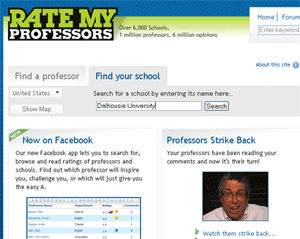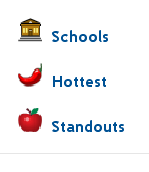 |
It’s that time of year again; birds are chirping, snow is melting, undergrads are sweating over exams and final papers. In case you overlook all aforementioned signs, there’s one that no student can miss – professors are standing in front of their classrooms, holding a stack of evaluations, dutifully reciting the guarantee of anonymity, and vacating the premises.
The evaluations, wise men say, will decide who gets tenure (if you sign your name!) or simply provide post-exam feedback to your prof (if you don’t!). The system is professional and logical, and many students—most of my lunch table, naming no names—fill in random boxes with their requisite number-two pencil, then flee to steal an extra 15 minutes.
But that’s OK. Fools and college students happily rush in where angels fear to tread, and students are now evaluating their professors via a more modern process – ratemyprofessors.com, which represents “Over 6,000 Schools, 1 million professors, 6 million opinions.” Type in a professor’s name or what they teach, and you’re seconds away from knowing how they “rate” compared to other profs at their school or department. Bonus: you can check their possession of the coveted “hot prof” chili pepper icon.
 |
| Ratemyprofessors' familiar icons. |
Savvy students take full advantage of this grassroots resource. “When I want to sign up for a class, I always check the professors on there,” second-year history major Gregory Morris confirms, shooting a look over a roast beef sandwich. “It doesn’t hurt.” I agree – I always check my professors out on ratemyprofessors.com, sometimes even after I’m confirmed for the course. (It’s fun to see who gets the chili pepper.)
What do the professors think of these Internet shenanigans? Of the four I e-mailed, one never got back to me, one professed never to have heard of the site, and the remaining two were ambivalent.
“I don’t know if there’s a problem or not. I think it’s good that students are taking charge of their education,” offers Kathy Cawsey – whose course on Authurian literature I took, but only after checking ratemyprofessors.com. “Students shouldn’t put up with bad teaching.”
But Dr. Cawsey has reservations about ratemyprofessors. “The same person could go on there 20 times, if they really hated you,” she points out, noting the website is imperfect and open to abuse. Also, the rant-and-rave nature of the beast opens a professor to plenty of criticism, but not much of it is constructive. “What’s useful to us (professors) is not whether people think we’re bad or good … But what we could do to improve.” Does she ever look herself up on the website? “Every once in a while,” she admits, with a laugh.
“I don’t know, really, how useful it could be,” says Jacqueline Warwick, who teaches popular music, doubtfully. “I can’t imagine why anyone would post to that unless they felt really strongly one way or the other.” But she too has checked her ratemyprofessors page — “a couple of times,” actually.
Like it or not, ratemyprofessors is here to stay. As students pick their new classes and professors, modems are a-whirring and lunchtables are abuzz. Gregory Morris dismisses the concerns of the maligned professors. Could ratemyprofessors.com possibly be a little unfair?
“Although you do get a few odd diatribes … the extreme ones get shunted aside.” Mr. Morris is aware that some professors aren’t fond of the site – with good reason. “One of my profs said (the site) was good for a laugh,” he mentions, smirking a little. “Then he commented that he (already) had tenure.”
